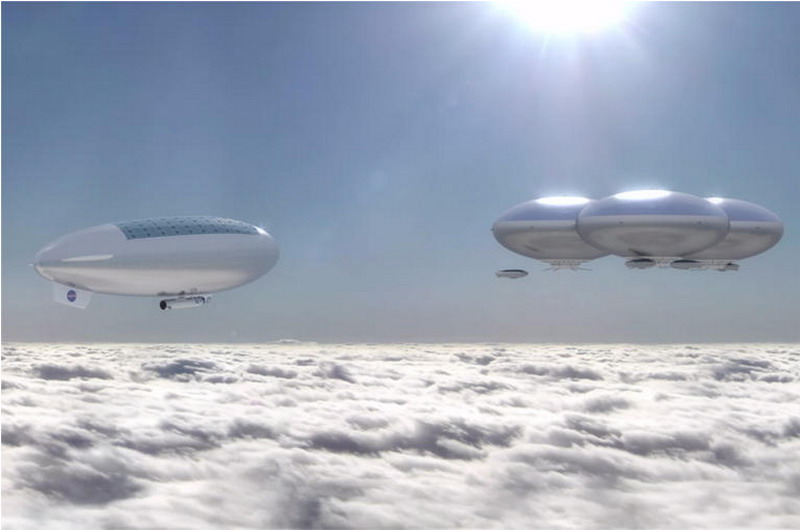Regarded as Earth's "sister planet", the atmosphere of Venus is no way similar to that of Earth's.
Venus is the second planet from the Sun in the solar system, and the hottest planet in the solar system with temperatures reaching 467 degree Celsius. The primary reason for the incredibly high surface temperature of Venus is its super dense atmosphere.
Atmospheric Composition Of Venus :
The atmosphere of Venus is primarily composed of carbon dioxide and is much denser and hotter than the atmosphere of Earth. The Venusian atmosphere also contain nitrogen and trace amount of other gases notably sulfur dioxide. The amount of nitrogen in the atmosphere is relatively much lower as compared to carbon dioxide, but, the atmosphere of Venus is so dense, that even this trace amount of nitrogen when compared by mass, is four times as the mass of nitrogen of the Earth!
This atmospheric combination causes runaway greenhouse effect which heat up the surface even high. The result is, even though Venus is farther away from the Sun, the surface of Venus is hotter than that of Mercury!
Chemical composition of the atmosphere of Venus :
- Carbon dioxide : 96 percent.
- Nitrogen : 3.5 percent.
- Carbon monoxide, sulfur dioxide, water vapor, neon, argon : less then 1 percent.
 |
| Image credit : Junkcharts |
In addition to greenhouse effect, the heavy sulfuric acid clouds of Venus prevent visible observation of the surface of the planet. The dense atmosphere also protects the surface from the impact of heavy meteorites. Anyone standing on the surface of Venus would experience 90 times more atmospheric pressure as compared to the surface of Earth. It is equivalent to diving 3000 feet or 900 meters into the ocean on Earth!
Even though Venus rotates about its axis slowly, once every 243 Earth days, the wind speed on Venus is high reaching 360 kph (224 mph). Due to the wind speed, the clouds on Venus are in constant motion and revolve around the planet every 4 Earth days!
The rain on Venus is composed of sulfuric acid (...talking about acid rain....). However, it is interesting to note that this sulfuric acid rain never reaches the surface of the planet. Due to high temperature and heat, the rain gets evaporated before it can reach surface.
The clouds of Venus may create lightning, however, debate are still in going on.
Climate and weather on Venus :
The thick clouds of Venus are mainly composed of sulfuric acid droplets (75-96%). These clouds prevent the optical imaging of the surface of Venus and reflects 75% of the sunlight incident on them! The density of the cloud layers of Venus also vary greatly, the densest layer is about 48.5 km thick.
The rain on Venus is composed of sulfuric acid (...talking about acid rain....). However, it is interesting to note that this sulfuric acid rain never reaches the surface of the planet. Due to high temperature and heat, the rain gets evaporated before it can reach surface.
The clouds of Venus may create lightning, however, debate are still in going on.
The most interesting patch of the Venusian atmosphere :
Even though the surface of Venus has bone melting temperatures and skull crushing pressure, there is a part of the Venusian atmosphere than is a lot like Earth!
The atmospheric pressure and temperature at an altitude of about 50 km to 65 km is nearly as that of Earth. This part is the most Earth like in the whole solar system, even more than the surface of Mars! According to the measurements by the Magellan and Venus Express probes, the altitude from 52.5 km to 54 km has a temperature between 20°C to 37°C. And at an altitude of 49.5 km the atmospheric pressure is similar to sea level pressure at Earth.
There are speculations that extremophiles found on Earth (micro-organism which can live in very harsh condition) can survive in the upper atmosphere. There are dark patches in the Venusian atmosphere which are caused by "unknown UV absorbers", this can be caused by these microbes. Though there are no solid evidence.
Manned missions have been proposed, where astronauts will use inflatable ships which will float at this altitude. As the carbon dioxide is heavier than air at Earth, our natural composition of nitrogen + oxygen will keep the ship floating in the atmosphere.
More information of the mission here.
What do you think? Can there be life on Venus? Share in the comments down below.





0 Comments